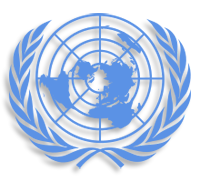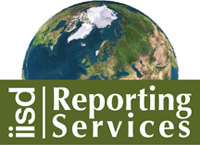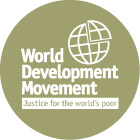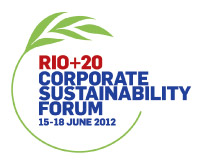
Earth Summit
Rio +20 Earth Summit - 2012 United Nations Conference
|
||||
Comment |
 |
Rio+20: A Call for Inspired Leadership
|
|
Peoples' Sustainability Manifesto
 Hundreds of civil society organizations converged in Brazil to unveil the "Peoples' Sustainability Manifesto" the final day of the United Nations Rio+20 Summit June 22, 2012. The Manifesto evolved through a consultative process for fourteen Peoples' Sustainability Treaties.
Hundreds of civil society organizations converged in Brazil to unveil the "Peoples' Sustainability Manifesto" the final day of the United Nations Rio+20 Summit June 22, 2012. The Manifesto evolved through a consultative process for fourteen Peoples' Sustainability Treaties.The Manifesto reads: "We, the signatories to this Manifesto, refuse to sit idly by in the face of another failure of governments to provide hope for a sustainable future for all. ... We pledge ourselves to: equity ... localizing our systems of economies ... [and] a Global Citizens Movement."
"It's fitting that we're launching the process in Rio de Janeiro, twenty years on from the 1992 Earth Summit. Governments at Rio are talking about institutional frameworks for sustainable development and the green economy. But these efforts will not succeed unless we also pay attention to the health of the world's dominant political system – democracy," stated Co-Chair of the Foundation for Democracy and Sustainable Development (FDSD) John Lotherington, whose organization lead the manifesto development process.
A public consultation process, soliciting feedback to finalize the Peoples' Sustainability Manifesto, will run until the end of November 2012. FDSD is also looking for champions of the manifesto, which is scheduled to officially launch in early 2013.
Sign the Peoples Sustainability ManifestoView Peoples' Sustainability Treaties on OccupyRio+20 page
View June 22, 2012 People's Sustainability Manifesto press release
View June 8, 2012 International Institute for Environment and Development coverage
View June 8, 2012 Foundation for Democracy and Sustainable Development press release
UN Sounds Alarm with Environment Outlook
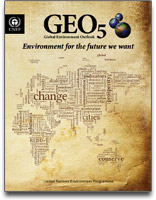 The United Nations Environment Programme's (UNEP) sounded the alarm in its fifth Global Environment Outlook (GEO-5) report, published two weeks before the Rio+20 summit in Brazil June 20-22.
The United Nations Environment Programme's (UNEP) sounded the alarm in its fifth Global Environment Outlook (GEO-5) report, published two weeks before the Rio+20 summit in Brazil June 20-22.The GEO-5 report, three years in the making and the United Nations' main health-check of the planet, urges governments to create more ambitious targets or toughen existing ones.
"If current trends continue, if current patterns of production and consumption of natural resources prevail and cannot be reversed and 'decoupled', then governments will preside over unprecedented levels of damage and degradation," said United Nations (UN) Under-Secretary General and UNEP Executive Director Achim Steiner.
GEO-5 assessed progress and gaps in meeting 90 internationally agreed goals from UN conventions. Significant progress was found for just 4 goals, with some progress made for 40 goals, and 32 goals with very little or no progress.
Some of the successful goals included: preventing ozone depletion, and providing access to clean water supplies. But GEO-5 detected little or no progress addressing climate change, depleting fish stocks and expanding desertification.
GEO-5 provides analysis on over 90 promising policies and 116 case studies to help countries speed up meeting internationally agreed upon goals.
UNEP called on governments to focus their policies on the key drivers behind climate change, notably: population growth, urbanisation, fossil fuel-based energy consumption, and globalisation.
Current models suggest greenhouse gas emissions could double over the next 50 years, leading to rise in global temperature of 3 degrees Celsius or more by the end of the century. That level of planetary warming would have catastrophic effects, with most of the impacts from climate change felt in developing countries in Africa and Asia, the GEO-5 report said.
View June 6, 2012 United Nations Environment Programme's (UNEP) report (PDF)View June 6, 2012 Huffington Post coverage
View June 6, 2012 CBC News coverage
View United Nations Conference on Sustainable Development Rio+20 page
Rio+20: A Defining Choice
 Next week, 20 years after the 1992 UN Rio Earth Summit, representatives of the world's governments will gather again in Rio de Janeiro, Brazil to frame a global response to the Earth's environmental crisis. Debates leading up to Rio+20 are focusing attention on a foundational choice between two divergent paths to the human future.
Next week, 20 years after the 1992 UN Rio Earth Summit, representatives of the world's governments will gather again in Rio de Janeiro, Brazil to frame a global response to the Earth's environmental crisis. Debates leading up to Rio+20 are focusing attention on a foundational choice between two divergent paths to the human future.
The Money Path
For money path advocates, money is the defining measure of value. Profit and growth in financial assets are the bottom line measures by which they assess the performance of both the firm and the economy. They value natural wealth by the price it will fetch in the market and look to global financial markets as the preferred mechanism to organize our human relationships with one another and nature.
The Life Path
For life path advocates, Earth is our living Mother, sacred and beyond price. Her health and vitality are essential to our well-being and are therefore a priority bottom line measure of economic performance. In return for Earth's gifts, we have a sacred obligation to future generations to protect and restore to full health the wondrous generative systems by which she replenishes her air, water, fertile soils, fish, forests, and grasslands, and maintains the stable climate on which our health and well-being depend.
View entire June 15, 2012 Yes! Magazine article
10 Things You Should Know About the Rio+20 Earth Summit
 In 1992, the Rio Earth Summit brought world leaders together around the frame of "sustainable development" and launched global agreements on biodiversity, climate change and desertification. Two decades later, the environmental and economic crises they had hoped to stave off–global warming, record extinction rates, depleted fisheries, vast economic inequality–are upon us. And so political leaders and grassroots activists are gathering again in Rio in late June to take up the planet's most pressing issues. Here are 10 things you should know about the Summit:
In 1992, the Rio Earth Summit brought world leaders together around the frame of "sustainable development" and launched global agreements on biodiversity, climate change and desertification. Two decades later, the environmental and economic crises they had hoped to stave off–global warming, record extinction rates, depleted fisheries, vast economic inequality–are upon us. And so political leaders and grassroots activists are gathering again in Rio in late June to take up the planet's most pressing issues. Here are 10 things you should know about the Summit:
View entire June 14, 2012 Yes! Magazine article
Rio+20 Dialogues: vote for the Future You Want
Over 10,000 participants contributed ideas and recommendations in the Rio+20 Dialogues online, which have now been condensed into 10 proposals in 10 different thematic areas. In June, the recommendations will be discussed in the Sustainable Development Dialogues and 30 will be chosen to be conveyed directly to world leaders and decision makers at the Rio+20 Conference.
View more information on Earth Summit 2012 website
Only One Earth: The Long Road via Rio to
Sustainable Development
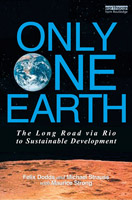 With Rio+20 just three weeks away, new book Only One Earth looks back over what has been achieved in the past forty years since the United Nations Conference on the Human Environment in Stockholm, and ahead to what critically needs to happen at Rio+20 and beyond. Written by Stakeholder Forum's Executive Director, Felix Dodds, and Earthmedia's Michael Strauss, with Maurice F. Strong, Former Secretary-General, "Earth Summit" [1992]; UN Conference on Human Environment [1972] and Executive Director, UNEP [1972-76].
With Rio+20 just three weeks away, new book Only One Earth looks back over what has been achieved in the past forty years since the United Nations Conference on the Human Environment in Stockholm, and ahead to what critically needs to happen at Rio+20 and beyond. Written by Stakeholder Forum's Executive Director, Felix Dodds, and Earthmedia's Michael Strauss, with Maurice F. Strong, Former Secretary-General, "Earth Summit" [1992]; UN Conference on Human Environment [1972] and Executive Director, UNEP [1972-76].
View Earth Summit 2012 coverage
Ahead of the Rio+20 Earth Summit,
a call for a paradigm shift
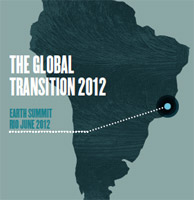 In June 2012, movements and leaders will meet in Rio for Rio+20, two decades after the Earth Summit was organised in 1992 to address urgent ecological challenges such as species extinction, biodiversity erosion and climate change. The Earth Summit gave us two very significant international environmental laws: the United Nations Convention on Biological Diversity and the United Nations framework Convention on Climate Change. It also gave us the Rio principles, including the Precautionary Principle and the Polluter Pays Principle.
In June 2012, movements and leaders will meet in Rio for Rio+20, two decades after the Earth Summit was organised in 1992 to address urgent ecological challenges such as species extinction, biodiversity erosion and climate change. The Earth Summit gave us two very significant international environmental laws: the United Nations Convention on Biological Diversity and the United Nations framework Convention on Climate Change. It also gave us the Rio principles, including the Precautionary Principle and the Polluter Pays Principle.
In both the Climate Treaty and the Biodiversity convention, trade and commerce is replacing conservation and the commons. Rights of Corporations is replacing the Rights of Nature and People.
And this change in values, from conserving and sharing to exploiting and privatising, is justified in the name of economic progress and economic growth. Yet the economic paradigm for which the Earth and Society are being pillaged and destroyed, is itself in deep crisis. Look at the farmers suicides and hunger and malnutrition crisis in India. Look at the protests in Greece, Spain or the Occupy movement of the 99% in the US.
View entire June 1, 2012 The Asian Age article
Green Groups Urge Obama to Attend Rio+20
With a month to go before the United Nations Conference on Sustainability in Rio de Janeiro, nearly two dozen NGOs are calling on President Barack Obama to confirm his attendance at the event, known as Rio+20.
President Obama's "presence at this Summit would signal its critical importance to all Americans, demonstrate our country's deep concern over urgent global issues that will inevitably affect our security and well-being, and highlight our nation's determination to be a contender in the race to a low-carbon green economy," according to an open letter (pdf) made public on Monday.
"U.S. leadership at Rio is essential," Don Kraus, CEO of Citizens for Global Solutions, a Washington-based national network, told IPS.
Recently U.N. Secretary-General Ban Ki-Moon noted that President Obama's personal participation at the summit would be "crucial". "We count on the United States," the secretary-general said at an event here in Washington late last month.
View entire May 22, 2012 Inter Press Service article
Blue Planet Prize-Winners Advise Rio +20
 The twenty past winners of the Blue Planet Prize, often called the Nobel Prize for the environment, presented a report, Environmental and Development Challenges: The Imperative to Act, at the United Nations Environment Programme (UNEP) meeting in Nairobi, Kenya February 20, 2012.
The twenty past winners of the Blue Planet Prize, often called the Nobel Prize for the environment, presented a report, Environmental and Development Challenges: The Imperative to Act, at the United Nations Environment Programme (UNEP) meeting in Nairobi, Kenya February 20, 2012."The paper by the Blue Planet laureates will challenge governments and society as a whole to act ... development challenges can be addressed, emphasizing solutions... and behaviour changes required to grow green economies, generate jobs and lift people out of poverty without pushing the world through planetary boundaries," said Achim Steiner, UN Under-Secretary General and UNEP Executive Director.
The stark assessment of the current global outlook commissioned by UNEP was prepared by agroup, that includes: Sir Bob Watson, United Kingdom chief scientific adviser on environmental issues; US climate scientist James Hansen; Prof José Goldemberg, Brazil's secretary of environment during the 1992 Rio Earth Summit; and Stanford University Prof Paul Ehrlich.. The report will feed into texts for the Rio +20 Earth Summit conference June 2012.
The report warns against over-reliance on markets and urges politicians to listen and learn from how poor communities all over the world see the problems of energy, water, food and livelihoods as interdependent and integrated as part of a living ecosystem.
"The rapidly deteriorating biophysical situation is more than bad enough, but it is barely recognized by a global society infected by the irrational belief that physical economies can grow forever ... the perpetual growth myth ...promotes the impossible idea that indiscriminate economic growth is the cure for all the world's problems, while it is actually (as currently practiced) the disease that is at the root cause of our unsustainable global practices," states the report.
The Blue Planet Laureates' paper urges governments to: replace GDP as a measure of wealth, eliminate subsidies in sectors with high environmental and social costs, tackle over-consumption, and address population pressure by empowering women, improving education and making contraception accessible to all.
View February 17, 2012 Blue Planet Laureate reportView February 21, 2012 Inter Press Service article
View February 20, 2012 Guardian article
View February 20, 2012 Common Dreams article
View February 20, 2012 Business Green article
View February 11, 2012 UNEP news article
Rio +20 Information Tools
UNCSD-L is a community announcement list for policy makers and practitioners involved in international sustainable development, particularly those focused on the preparations for the 2012 UN Conference on Sustainable Development (UNCSD, also referred to as Rio +20). This free knowledge-sharing tool is managed and moderated by the International Institute for Sustainable Development (IISD) Reporting Services.
The launch of UNCSD-L comes as the UN, governments, academics, NGOs, businesses and the media undertake preparations for UNCSD. The UNCSD will convene 20 years after the 1992 UN Conference on Environment and Development (UNCED, also known as the Rio Earth Summit), and will seek to assess implementation of previous commitments while addressing new and emerging challenges to sustainable development.
View IISD websiteView IISD Reporting Services website
Join UNCSD-L Mailing List
View Sustainable Development Policy & Practice website
Rio+20 Contest: Win a Date With History
A diverse jury of prominent celebrities, environmental activists and thought leaders will select one winner who will travel to Rio de Janeiro to participate in the summit and to share their vision!
View Date With History websiteCanada Rio +20 Civil Society Consultations
The Department of Foreign Affairs and International Trade Canada (DFAIT) and the Canadian Environmental Network (RCEN) have selected key regional environmental NGOs to host consultation events with civil society groups across the country. Each consultation will be centered on a series of think pieces developed by SF and UNEP's Green Economy Report.The results of the consultations will inform the Canadian UNCSD delegation as well as the UN Environment Programme and the UNCSD Secretariat as to RIO + 20 priorities.
Civil Society recommendations will also be compiled into a draft consultation document to be presented at a final workshop scheduled in Ottawa November 2011. Consultations have already taken place in Toronto, Vancouver, and Calgary. The remaining consultations will be held in September, 2011 in the following cities: Montreal, Winnipeg, Halifax, Ottawa, Saskatoon, Québec City, Fredericton, St. John's.
Special Rio+20 Edition of the Journal of International Affairs
View May 2012 "Special Issue: Rio+20 and the global environment: reflections on theory and practice" International Affairs, Volume 88, Issue 3, Pages iii-xi, 457-682
Ri0+20 Forum on Corporate Sustainabilitty
The Forum aims to strengthen the business contribution to sustainable development globally - seeking to bring greater scale to responsible business practices, to advance and diffuse sustainable innovation, and to stimulate broader collaboration between companies, governments, civil society and the UN.
View Rio+20 Corporate Sustainability Forum: Innovation & Collaboration for the Future We Want webpageUNESCO IOC Highlights Ocean Issues Ahead of Rio+20
The Intergovernmental Oceanographic Commission (IOC) of the UN Educational, Scientific and Cultural Organization (UNESCO) and Kriton Arsenis, Member of the European Parliament (MEP), held an information session at the European Parliament to raise awareness on ocean-related issues in the lead up to the UN Conference on Sustainable Development (UNCSD, or Rio +20). Participants heard expert presentations on the main threats to the oceans, including: ocean acidification; overfishing and illegal fishing; and biodiversity loss. Other presentations stressed the importance of science, monitoring and assessment for the sustainable management of the oceans.
Key actions identified include the further development of existing tools for actions, such as Regional Seas for the protection of Areas Beyond National Jurisdiction, and facilitating cooperation and synergies through initiatives such as the Joint Programming Initiative for Healthy and Productive Seas and Oceans (JPI Oceans).
View entire March 14, 2012 IISD Reporting Services articleRio+20: A Break-Up Destination for Idealistic Enviros
View entire February 22, 2012 Huffington Post article
 2002-2014
2002-2014


